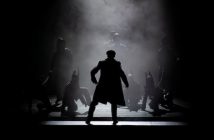The audience last night at Sadler’s Wells was almost as colourful as the performers on stage – there was a sea of brilliantly coloured shalwar kameez in the bar (I felt quite dowdy by comparison). We were all there to see Ishq, a show that announces itself as London’s first ever Anglo Punjabi Sufi musical – a claim unlikely to be disputed.
Based on a legend by the Sufi saint and poet Waris Shah, it is a romance (“Ishq” means “love”) that combines classical and contemporary dance and music. Think Romeo and Juliet in the Punjab. The love of the two protagonists, Heer and Ranjha, is also, allegorically, the love of humanity for its creator. And, as if that wasn’t enough, the show has an extremely worthy political agenda – championing the rights of women within Islam.
It is a heavy load for one show to carry. From Slum Dog to classical flute, boy band to traditional dance, a touch of Les Mis and Dervish whirling and some rapturously received drumming (with audience participation), this was a mix of styles too far. It aimed for fusion but the result was a stop-start series of scenes that stood alone not just in terms of each having a different musical style but a narrative one, too. Was this a romantic folktale, a Bollywood musical or a panto?

Adnan Jaffar as Kaido, the splendid villain, is definitely in the last camp, declaring himself with a knowing wink at the audience a “stereotypical villain” – as, he explains, can be seen by the way he drags himself on a crutch across the stage. He is the wicked uncle (he received appropriate hisses on his second appearance) of the heroine, Heer (Rasheeda Ali). She came from a quite different school of acting, a bit of Disney princess with fluttering hands and lashes and a lovely, strong voice that she put to good use belting out her declaration of love.
There were some stand-out scenes from the energetic young cast (loved the Bollywood one) and great dancing generally, from street fighting to eastern classical. And the sets, and in particular the projected backdrops, painted on before your very eyes in broad brush strokes, were superb. I would imagine in its normal setting of world heritage sites – rather than the very different, more confined space of a London theatre – Ishq would have a magical Scheherazade quality. Here, though, the narrative lacks the necessary drive.
That narrative is interrupted, too, by plenty of religious dilemma (does music conflict with religion?) and teaching (the dangers of the ego, the need for a spiritual journey) and, most importantly, the role of woman within Islam. Heer is the woman who challenges patriarchal authority for the sake of love and is ultimately defended by the king who declares no marriage is valid without the woman’s agreement. Of course, this doesn’t guarantee a happy ending (no spoilers here but watch out for Kaido).

During the interval I was handed a flyer for a traditional qawwali concert coming up at SOAS to be held in support of Safety4Sisters (a charity for vulnerable migrant women). It seemed apt because this is a show that has campaigning in its soul. The producer and director, Huma and Farooq Beg, see it as a way of highlighting the rights of women according to Islam – emancipation, gender equality, freedom, free speech, choice. And that is something we can surely all applaud.
ISHQ ran at Sadler’s Wells from 7th-9th September 2017. Production images by Lidia Crisafulli. For more information please visit the website.




